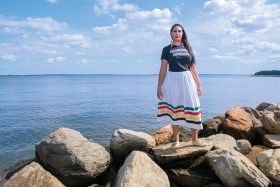Indigenous Arts & Culture Winter Series
January 6, 2022
The Board of Directors of Pinewoods Camp invites you to a virtual series focused on the indigenous arts, song and cultural practices of the Northeast.
Invited by the Committee on Inclusion and Antiracism, Leah Hopkins and Jonathan James-Perry, cultural bearers and educators, met with the board of directors at Camp in November. Jonathan and Leah will share with the Pinewoods music and dance communities and the Six Ponds and greater Plymouth communities some of what they shared with us, and more.
There is no fee, however space is limited and registration for each session is required.
Tuesday, January 18 | 7:00-8:00pm | Zoom
Exploring Indigenous Arts and Cultural Practices in the Coastal Woodlands

Leah Hopkins (Narragansett)
Photo Credit: Nora Lewis
Zoom Registration Link: Click HERE
Cultural Educator, Leah Hopkins (Narragansett) will explore the continuity of Indigenous arts in the Coastal Woodlands region and discuss Indigenous relationships to the land, water and Natural World. She will shed light on the impacts of climate change on Indigenous traditions and the resilience of arts, culture and self expression in modern Native communities.
Tuesday, February 15 | 7:00-8:00pm | Zoom
Voices of the Land: Indigenous Songs of the Northeast

Jonathan James-Perry (Aquinnah Wampanoag)
Zoom Registration Link: Click HERE
Cultural educator, singer and performer Jonathan James-Perry (Aquinnah Wampanoag) shares with us the deep time history of Eastern-style social dance songs of the Northeastern region. Explore the various styles of singing and instrument usage, as well the traditions and protocols of these seasonally-based songs.
Tuesday, March 15 | 7:00-8:00pm | Zoom
Indigenous Connections to the Land and Building a Meaningful Acknowledgement
Zoom Registration Link: Click HERE
Join Cultural Educators Leah Hopkins (Narragansett) and Jonathan James-Perry (Aquinnah Wampanoag) as they provide insight on the complexities of Indigenous connections to the land and sea, and how colonization has changed these relationships over time. Learn about the protocols of land acknowledgement and explore how building a meaningful land acknowledgement can begin the process of respectfully engaging with Indigenous people and communities.
Leah Hopkins Bio
Leah Hopkins, mother, educator, culture bearer, subsistence practitioner and museum professional, is an enrolled member of the Narragansett Indian Tribe of Rhode Island. Leah works to develop and implement programs, curricula and digital content for Indigenous and non-Indigenous audiences about Native history, culture, values, lifeways and practices. She also works to ensure cultural continuity of the area’s Indigenous peoples through programs, workshops and advocacy. She is a professional speaker, consultant, traditional dancer and singer grounded in Narragansett land and sea based practices. Leah works collaboratively with Indigenous and Tribal communities, museums, and other institutions to ensure best practices in programming and education initiatives that promote the visibility and ensure the perspectives of Indigenous populations in New England.
Leah holds a BA in Anthropology from the University of Rhode Island, and has a background in museum and tribal education that spans over 10 years, working at both the Mashantucket Pequot Museum and Research Center, the Wampanoag Tribe of Gay Head (Aquinnah), and with other regional institutions, organizations and tribal communities. Leah is currently the Community Engagement Specialist at the Haffenreffer Museum of Anthropology at Brown University. In her personal time, Leah enjoys playing with her son and taking him out on the land and the water to teach him about the traditional subsistence lifestyle and ensure that the next generation maintains cultural continuity.
Jonathan James-Perry Bio
Jonathan Perry is an Aquinnah Wampanoag culture bearer, leader, historian, artist and professional speaker. He is grounded in the traditions of his ocean-going ancestors. His material work embodies the refined quality of that of his ancestors, while still drawing upon his experience in a contemporary society. Jonathan’s pieces reflect balance within the Natural World, incorporating stories, effigies, and symbology of Wampanoag traditions. He is currently serving his fifth, three-year term as Councilman for the Wampanoag Tribe of Gay Head (Aquinnah). Jonathan works diligently to enforce and uphold the sovereignty of his tribal nation as well as to maintain cultural continuity among his tribal citizens. He has over fifteen years of experience working within the Tribal Historic Preservation Office, with the responsibility of protecting and preserving cultural sites of significance throughout southern New England. He currently works for the Elders Council at the Mashantucket Pequot Tribal Nation to ensure cultural continuity and preservation within the community. Jonathan has over twenty years of experience in the research and historical interpretation of Eastern Woodlands Native culture and art. He has worked with various non-profit and tribal organizations in exhibit design and cultural consultation based on traditional Wampanoag knowledge, symbolism, and values. Jonathan was most recently awarded the 2017 First People’s Fund Jennifer Easton Community Spirit Award for his work in reviving Wampanoag maritime traditions.
